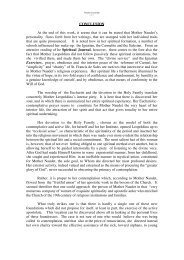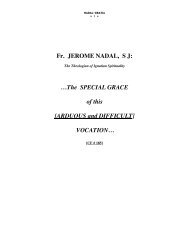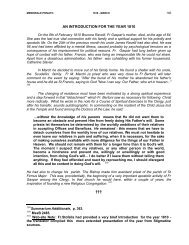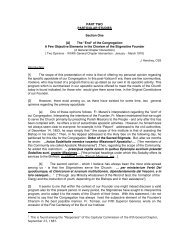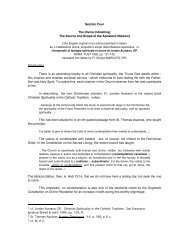[B.] St. IGNATIUS of LOYOLA Presentation: The ... - St. Gaspar Bertoni
[B.] St. IGNATIUS of LOYOLA Presentation: The ... - St. Gaspar Bertoni
[B.] St. IGNATIUS of LOYOLA Presentation: The ... - St. Gaspar Bertoni
Create successful ePaper yourself
Turn your PDF publications into a flip-book with our unique Google optimized e-Paper software.
INTEGRE;SJ-OFM<br />
= 28 =<br />
1803: <strong>The</strong> Perfection <strong>of</strong> Necessity: You shall be perfect, and without spot before the<br />
Lord your God [Dt 18:13] [cf. <strong>St</strong>. Thomas for whom perfection is that from which nothing is<br />
lacking].<br />
<strong>The</strong> Gloss adds here: ‘without criminal stain’. - Prosper writes in his “Concerning the<br />
Contemplative Life”: the perfect are those who, willing what God wills, do not acquiesce in any<br />
sins by which He is <strong>of</strong>fended.<br />
<strong>The</strong> Perfection <strong>of</strong> Supererogation: Mt 19:21: If you will be perfect, go sell what you<br />
have and give to the poor… Jerome wrote to Heliodorus: <strong>The</strong> perfect servant <strong>of</strong> Christ has<br />
nothing other than Christ: and if he/she have something other than Christ, such a person is not<br />
perfect.<br />
<strong>The</strong> Perfection <strong>of</strong> Ultimate Fullness: Pr 4:18: But the path <strong>of</strong> the just, as a shining<br />
light, goes forward and increases even to perfect day. [this means: the resplendent clarity <strong>of</strong><br />
the divine vision]. <strong>St</strong>. Augustine in his Soliloquy, 1: <strong>The</strong> truly perfect virtue is that reason which<br />
comes all the way to the end, where the blessed life is achieved.<br />
1804: <strong>The</strong> first and the second perfection differ from the third much like merit differs from<br />
reward. <strong>The</strong> Median perfection differs from the Lowest level much like a consul is distinguished<br />
from a precept. All <strong>of</strong> these were in Blessed Francis, as appears from the reading <strong>of</strong> his Legend;<br />
all precepts as well as counsels refer to the fulfillment and the observance <strong>of</strong> that charity.<br />
1 Tm 1:5: Now the end <strong>of</strong> the commandment is charity, from a pure heart, and a<br />
good conscience, and an unfeigned faith.<br />
Decline from evil - accomplish good - and patiently endure adversities.<br />
In these words the three-fold act <strong>of</strong> charity is insinuated: on account <strong>of</strong> the declining from<br />
evil, there is the ‘pure heart’; on account <strong>of</strong> the following <strong>of</strong> good, there is the ‘good conscience’;<br />
on account <strong>of</strong> the tolerance <strong>of</strong> adversities, there is the ‘unfeigned faith’. I.e., a faith that is not<br />
fragile and weak, but one that is strong against adversities.<br />
1805: This three-fold act <strong>of</strong> charity proceeds in two ways from the habit <strong>of</strong> the virtue: either<br />
according to the law <strong>of</strong> precept and <strong>of</strong> necessary, or universal obligation; or, according to the law<br />
<strong>of</strong> counsel and that <strong>of</strong> spontaneous and spiritual obligation: the second includes the first, and<br />
adds to it in so far as the possibility <strong>of</strong> the wayfarer would admit. So it is that the second level is<br />
said to be ‘perfect’ with regard to the first: however, with respect to the second, more advanced<br />
level, the first is said to be imperfect.<br />
1806: Ambrose writes in his Concerning the Offices: every <strong>of</strong>fice is either median or perfect;<br />
which can be proven from the authority <strong>of</strong> the Scriptures. Mt 19:7: If you will enter life, keep the<br />
commandments. V. 18: You shall do no murder, you shall not commit adultery. <strong>The</strong>se are the<br />
duties <strong>of</strong> the Median level, to which something is still lacking. V. 21: If you will to be perfect, go<br />
sell what you have, and give to the poor, …and come, follow me . This is the Perfect duty, which<br />
the Greeks call catorthoma, by which all are corrected which might leave some still lapsed. [<strong>The</strong><br />
saint treats these in De Off. 1, 35, f. - t. 2. 11 B ].<br />
1807: <strong>The</strong>refore, we are treating <strong>of</strong> evangelical perfection according to the common<br />
acceptance, and we intend to speak <strong>of</strong> this Median Perfection.<br />
From what has been said it might be gathered that evangelical perfection is the<br />
conformity <strong>of</strong> the way-farer to Christ, through that habit <strong>of</strong> virtue by which evils are declined from<br />
in a supererogatory manner, goods are accomplished, and adversities are suffered. In these<br />
three, three levels <strong>of</strong> evangelical consist, which the Blessed Francis perfectly achieved. In the<br />
mystery <strong>of</strong> this Christ consigned him with His own Sacred <strong>St</strong>igmata as a testimony <strong>of</strong> his<br />
consummate imitation and evangelical perfection.<br />
And patience has a perfect work [Jas 1:4], in fortitude and perseverance unto the very<br />
end <strong>of</strong> the cross and <strong>of</strong> life: And you are they who have continued with me, Lk 22:28: to the very


![[B.] St. IGNATIUS of LOYOLA Presentation: The ... - St. Gaspar Bertoni](https://img.yumpu.com/33393889/28/500x640/b-st-ignatius-of-loyola-presentation-the-st-gaspar-bertoni.jpg)
